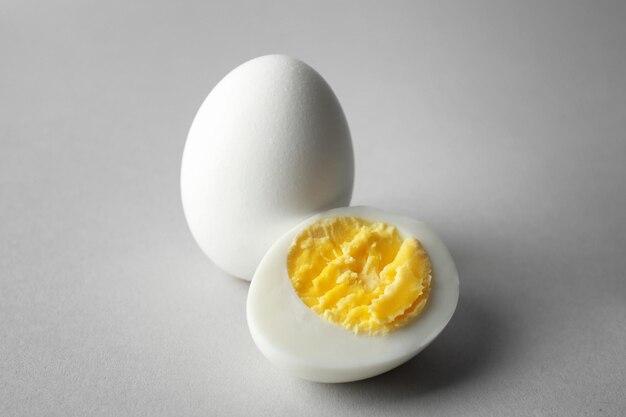Have you ever cracked open an egg, only to find that the yolk looks a little… off? Maybe it’s grey instead of that vibrant yellow we’re used to seeing. It’s not exactly appetizing, and you’re probably left wondering if it’s safe to eat. Well, fear not! In this blog post, we’re going to explore the mysterious world of grey egg yolks and answer all your burning questions.
From understanding what causes a grey egg yolk to determining if it’s still edible, we’ll cover it all. We’ll even dive into related topics such as overcooked eggs, spoiled eggs, and the dreaded salmonella. So, if you’ve ever wondered why your scrambled eggs turned grey or why your hard-boiled eggs have darker yolks, you’ve come to the right place.
So, get ready to uncover the truth about grey egg yolks and put your worries to rest. Let’s make sure your breakfast is not only delicious but safe to eat as well!

Can You Eat a Grey Egg Yolk
If you’ve ever cracked open an egg and been greeted with a greyish hue staring back at you, it’s natural to feel a mix of confusion and concern. After all, we’re used to seeing bright yellow yolks, right? But fear not, my fellow egg enthusiasts, for I am here to answer the burning question on your mind: Can you eat a grey egg yolk? Let’s dive into this culinary quandary and separate fact from fiction.
The Mystery of the Grey Yolk
First things first, let’s unravel the mystery behind the grey yolk phenomenon. Contrary to popular belief, a grey or greenish yolk is not an indication of a rotten or spoiled egg. Instead, it’s a result of a chemical reaction between the iron in the yolk and sulfur in the egg white. This reaction occurs when eggs are cooked for too long or at excessively high temperatures.
The Truth: Is It Safe to Eat
Now, onto the burning question: Can you safely consume a grey egg yolk? The answer is a resounding yes! While the color may be off-putting, rest assured that it poses no harm to your health. The overcooked eggs may result in subtle changes in taste and texture, but they are still perfectly edible. So, if you’re feeling adventurous or happen to encounter a grey yolk, go ahead and take a bite without worry!
How to Avoid Grey Yolks
To prevent the occurrence of grey yolks, there are a few simple steps you can take in the kitchen. Firstly, make sure you cook your eggs gently and at the right temperature. Avoid boiling them vigorously or exposing them to excessive heat. It’s also essential to monitor the cooking time carefully. Overcooking your eggs can not only lead to grey yolks but also a rubbery texture.
The Quest for the Perfect Yolk
For those who crave that sunny, golden yolk, fear not, for there are ways to achieve that vibrant hue every time. To achieve a perfect yolk, start by bringing your eggs to room temperature before cooking. Then, carefully place them in a pot of simmering water and let them cook for around 7-8 minutes for a delightful runny yolk or 9-12 minutes for a slightly firmer, custardy center. Once cooked, plunge them into ice water to halt the cooking process and keep that yolk looking as glorious as ever.
Embrace the Adventure
While a grey yolk may not be the sight you were hoping for when cracking open an egg, it’s a harmless quirk. In fact, it can even add a touch of excitement and adventure to your culinary endeavors. So the next time you stumble upon a grey-yolked egg, embrace the unexpected, cook it up, and let your taste buds do the talking. Don’t let the color deter you from savoring the deliciousness that lies within!
In conclusion, although a grey egg yolk may initially raise eyebrows, it is absolutely safe to eat. Remember to adjust your cooking methods to avoid the discoloration, but don’t be afraid to welcome the occasional grey yolk into your breakfast routine. Life is full of surprises, and sometimes even your breakfast eggs want to join in on the fun.

FAQ: Can You Eat a Grey Egg Yolk
So you cracked open an egg and to your surprise, the yolk wasn’t its usual sunny yellow. Instead, it was grey! Before you start panicking and questioning the quality and safety of the egg, let’s dive into some frequently asked questions about grey egg yolks.
Can You Eat Grey Scrambled Eggs
Sure, grey scrambled eggs might not look as appetizing as their vibrant yellow counterparts, but they are perfectly safe to eat. The greyness is often caused by overcooking, which can happen when the eggs are exposed to high heat for too long. So, while they may not win any beauty contests, grey scrambled eggs won’t harm you.
Can I Eat a Grey Egg
While a grey yolk may raise some eyebrows, it’s not an immediate cause for concern. Grey yolks can result from overcooking or overboiling the eggs, leading to a harmless chemical reaction. Rest assured, eating a grey egg won’t land you in any trouble, but perhaps you might want to check your cooking skills.
How Do You Know if Egg Yolks Are Bad
Determining if egg yolks have gone bad is crucial for your health and taste buds. Here are a few signs that indicate spoilage:
- Smell: A rotten egg stench is an obvious indicator that your egg yolks have seen better days. Trust your nose and stay far away from that foul odor.
- Appearance: If the yolk has green or pink discoloration, it’s time to say goodbye. Additionally, any mold growth on the yolk is a definite no-no.
- Texture: A runny or slimy consistency is a clue that the yolks have gone bad. They should be firm and not turn into a gooey mess.
Why Did My Egg Turn Green
Green eggs may evoke Dr. Seuss memories, but they can be a real-life occurrence too. A greenish hue usually appears around the yolk of overcooked hard-boiled eggs, caused by a chemical reaction between the iron in the yolk and sulfur compounds. While not dangerous to eat, they might need some extra seasoning to distract from their odd color.
Can You Eat Two Week Old Hard-Boiled Eggs
Two-week-old eggs? You must be yolking! While hard-boiled eggs can be a convenient snack, they do have a shelf life. To err on the side of caution, it’s best to consume hard-boiled eggs within a week of cooking them. So, remember: boil, refrigerate, and enjoy them in a timely manner.
How Do You Know if an Egg Has Salmonella
Ah, the infamous salmonella. To detect if an egg is contaminated, you don’t need to consult Sherlock Holmes. Here are the signs to look out for:
- Cracked or dirty shells: If the shell is compromised, bacteria can enter. Opt for eggs without cracks or dirt to minimize the risk.
- Unusual appearance: While it won’t have neon signs, a spoiled egg may have an off-putting look. Pay attention to any odd textures or discoloration.
- Smell: Trust your nose! If the egg emanates a foul odor, discard it immediately. A healthy egg won’t have an unpleasant scent.
What Happens if I Eat a Spoiled Egg
Eating a spoiled egg can lead to an unpleasant experience, and we’re not just talking about the taste. Common symptoms of consuming a spoiled egg include stomach discomfort, nausea, vomiting, and diarrhea. So, if a questionable egg crosses your path, it’s better to be safe than sorry.
Are Hard-Boiled Eggs Bad if the Yolk is Dark
No need to egg-splore other options just yet! A dark yolk in a hard-boiled egg is perfectly fine and safe to eat. The color can vary based on the hen’s diet and breed. So, don’t dye a sad face on your hard-boiled eggs just because their yolks are a bit darker.
What Does a Darker Yolk Mean
If you cracked open an egg and discovered a yolk that’s richer in color than usual, fear not. A darker yolk is typically an indication of the hen’s diet, particularly if they consume foods high in carotenoids. While the taste may remain relatively the same, the sight of a vibrant yolk can surely make your breakfast a little more egg-citing.
What Chickens Lay Grey Eggs
Although the majority of chickens lay eggs with white or brown shells, a few rare breeds can produce grey eggs. One such breed is the Svart Hona, a Swedish chicken known for its distinctive black appearance and charcoal-colored eggs. So, don’t be chicken to try something different if you ever come across these unique eggs!
What Color Egg Yolk is Healthy
Healthy egg yolks come in various shades of yellow and orange, with no signs of discoloration or off-putting smells. They should also have a firm texture. Remember, the color of the yolk can vary depending on the hen’s diet, so embrace the beautiful spectrum of naturally healthy yolks!
Can You Eat Eggs Two Months Out of Date
Egg-cellent question! While it’s not advisable to play egg roulette, eggs can often be eaten safely past their “best by” date. Before committing to this culinary adventure, perform the float test. If the egg sinks in a bowl of water, it’s safe to eat. However, if it floats, it’s time to bid farewell.
Why is My Raw Egg Yolk Black
Black might be a coveted color in fashion, but not so much in raw egg yolks. If you come across a black yolk, it could be a sign of bacterial or fungal contamination. Give it a hard pass and discard that egg immediately. Remember, black is not the new yellow when it comes to raw egg yolks!
How Long Do Eggs Last in the Fridge
Eggs are a breakfast staple, but they don’t last forever. To keep them fresh, store them in the refrigerator, preferably in their original container. Here’s a simple guide for egg freshness:
- Fresh: Consume within 4-5 weeks of the pack date.
- Hard-boiled: Consume within 1 week.
- Raw: Consume within 3-5 weeks after purchase.
And there you have it—a cracking set of frequently asked questions about grey egg yolks and the world of eggs in general. Remember, when it comes to eggs, a little knowledge can help you avoid getting into a scramble!